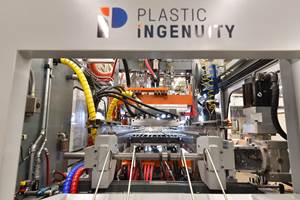Reopening America: Winnebago Industries Goes Back to Work
Plants in five states have reopened, after a variety of measures taken to support employees, customers and communities.
With coronavirus-inspired lockdowns gradually easing in some locations, Winnebago Industries announced restarting of production at its nine U.S. plants on a staggered schedule from April 13 through May 11, aligned with a confirmed base of existing orders. Winnebago is a major producer of recreational vehicles, motor homes and boats (Chris-Craft brand), based in Forest City, Iowa. The company voluntarily ceased production operations (while maintaining “essential activities for its dealers and end customers”) during the week of March 23rd. As of the end of its second fiscal quarter on Feb. 29, the company had more than 5500 employees and was on its way to $2.4 billion annual revenues.

While plastics processors nationwide are wrestling in their own ways with the economic challenges posed by the pandemic, there is much to admire, and perhaps envy, in Winnebago’s approach.
As the company resumes operations, all employees are required to adhere to applicable safety protocols, including social distancing, strict sanitizing practices, use of personal protection equipment (PPE), and daily employee health checks.
The company provided base pay and benefits for the first two weeks of the shutdown, and maintained medical and dental insurance benefits for the entire duration, paying the employees’ portion of the insurance premiums. And the company is maintaining medical and dental coverage for any employees that remain furloughed after the plants reopen.
During the shutdown, Winnebago implemented various cost-containment measures, including reducing CEO Michael Happe’s salary by 25% for the remainder of Fiscal 2020, while also cutting the Board of Directors’ cash compensation by 25%, “materially reducing” cash compensation for the Executive Leadership Team, and postponing merit increases for salaried employees for that period.
Meanwhile, the company launched the WGO Together Fund, described as “a COVID-19 emergency assistance resource for Winnebago Industries employees with particularly high financial hardship due to the pandemic.” The fund is supported by a multiple six-figure grant from the Winnebago Industries Foundation and offers a dollar-for-dollar match, up to a certain cap, to employees, families and friends who wish to make tax-deductible contributions to the fund.
According to a company statement, the Winnebago Industries Foundation also has “provided timely funding in support of COVID-19 response and recovery across its communities in Iowa, Indiana, Minnesota, Florida, and Oregon, to address immediate needs such as hunger and childcare for healthcare workers.”
The company also has been producing medical masks and face-shield parts for MercyOne North Iowa Medical Center and donated 1000 N95 masks and numerous sets of protective gloves to the Beacon Health System in Indiana.
Winnebago Industries has been well positioned to make these efforts on behalf of its employees, customers and communities. It has a strong liquidity and financial condition, with $123 million of cash on hand at the end of February, which increased materially during March and April. The company also has access to a $193 million line of credit that it has not yet tapped.
And the market picture for Winnebago is looking up: CEO Happe stated on April 29, “We are cautiously optimistic about several indicators within the outdoor industry, including an uptick in campground reservations and marina traffic in select areas, continued low gas prices and interest rates, easing of stay-at-home restrictions in some states, and improved access to some state and national parks.”
Related Content
Making Gains in the Drain Game
AWD blends extrusion and thermoforming technologies with plenty of home-brewed equipment and processes to keep water away from where it isn’t supposed to be.
Read MoreOrigin Materials Unveils CapFormer for Producing PET Caps
Factory acceptance test completed at commercial scale.
Read MoreA Processor's Perspective: What's Driving Growth in Heavy-Gauge Thermoforming
Key factors for the progress are innovative materials, advanced automation and precision engineering.
Read MoreIngenuity Is Part of This Former’s Name, and in Its DNA
Plastic Ingenuity started in a garage in 1972 and through a commitment to developing best-in-class products stands today as one of the largest custom thermoformers in the world.
Read MoreRead Next
Making the Circular Economy a Reality
Driven by brand owner demands and new worldwide legislation, the entire supply chain is working toward the shift to circularity, with some evidence the circular economy has already begun.
Read MoreFor PLASTICS' CEO Seaholm, NPE to Shine Light on Sustainability Successes
With advocacy, communication and sustainability as three main pillars, Seaholm leads a trade association to NPE that ‘is more active today than we have ever been.’
Read MoreBeyond Prototypes: 8 Ways the Plastics Industry Is Using 3D Printing
Plastics processors are finding applications for 3D printing around the plant and across the supply chain. Here are 8 examples to look for at NPE2024.
Read More


























